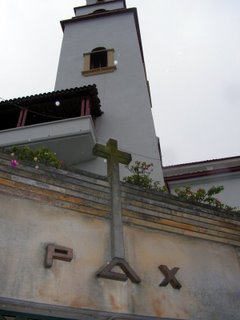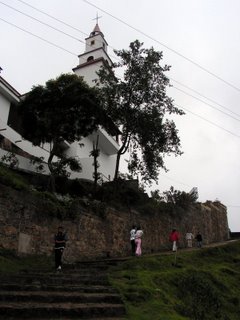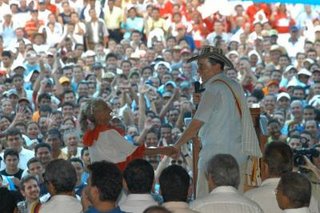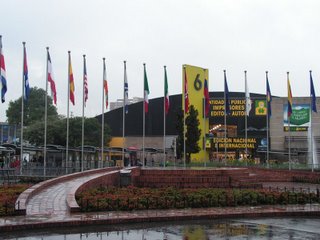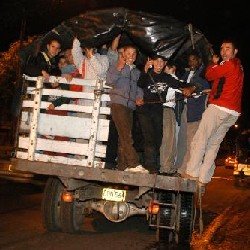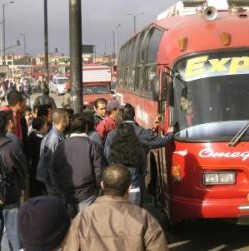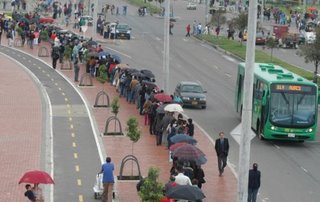God, I miss home some days. Today was not one of them, but looking over the
Not for Tourists: Atlanta map of the
West End, and listening to Shawn Colvin, it's about to turn into one.
That and the Delta itinerary sitting in my inbox, taunting me with its cool lines and long waits (one month and counting, give or take a week...) - I can almost taste the sweet tea, feel the nearly indescribable chill through the summer sweat that is a Georgia night in July, sense the buoyancy in my step as I walk down those city streets again, the only fool on a Friday night on Central Ave after the last class of the week. Ah, nostalgia. It's always hit me hard, even as a kid - driving to Kentucky in the middle of the night (our preferred travel hour) the dull blue gleam on the grass as the headlights swung past would settle into my skin and not let me go.
But Colombia, Colombia is nice. [I use that word a lot, I've noticed. Nice. Something Colombia is definitely not, no matter what other wonderful words could be used to describe it. It's not nice. Nice is Grandma's cooking, a little bland maybe but nice, or my neighbor's haircut. Not Colombia. Colombia is surprising, confusing, and alive.]
Today I went from my bedroom to the kitchen to the park to the living room, and then back to my bedroom. I got lots of reading done, and after a Monday spent getting stuck in downpours on my way to meet with people, waiting to give a workshop at the girls' school that never happened, shopping on the city's most hectic street for running shoes, and counting comments (see yesterday's post), I was ready for a quiet day of reading and running.
My jog at Simon Bolivar turned into a bit of a swamp march, as the lake had flooded the path in more than one spot. It's been raining every day here, sometimes all day. And it's cold, in a city where no one has any heat. I cook on the stove a lot, and I find myself rubbing my hands over the soup pot. When I read that Bogota's climate was "
perpetual spring," I thought they meant ATLANTA spring. I have since discovered my Atlanta bias led me astray - it's more like a Boston spring. If you're coming to visit, I don't recommend the rainy season - although the
book by the same title, about Haiti, is one of my all-time favorites.
This week I started working on interviews for a podcast: Pensativa en Colombia. I'm asking all the Fulbright recipients a question I've been asked a million times, "Why Colombia?" So far I've interviewed (if you can call all the giggling I'm going to have to cut from the tape an interview) my roommate, Ellie, and a Fulbright-Hays scholar on journalism, June (less giggling on that one - I learned when to turn the tape off). June, through a series of coincidences, worked as a journalist in Colombia for years, and has endless and fascinating stories to tell. I was surprised by how much I learned from Ellie's interview, not because I thought she didn't know anything, but since we live together I thought I knew pretty much what she was working on.
I love being surprised by people. The other day I got a mini-lecture from the butcher downstairs on an isolated community on the northern coast of Colombia. We have such an erudite butcher! He's one of those community connectors good places tend to have. Speaking of lectures, tomorrow morning I'm going to a conference on the urban repercussions of migration at my favorite library, Virgilio Barco. The mayor is supposed to be on the first panel.
I'm doing all this research about participatory budgeting, decentralization, public participation, but what I really want to do is get to interview the mayors, and think about how personality influences that sticky word political scientists love to throw around: governance.
Actually, I have to admit I love the reading I've been doing lately. I think I've finally found the (still rather too large) niche I want to explore: why do people participate in public affairs? How do demographics, institutional structure, and social issues influence who takes part? And once I recognized that I was having difficulties reading Spanish, the block just disappeared. My wall of knowledge is growing once again after a few slow weeks.


Also tomorrow I'm interviewing my first NGO, Habla/Scribe (article written by the organization's founder on a literacy campaign that put words in the hands of people, literally,
here) Wish me luck!
